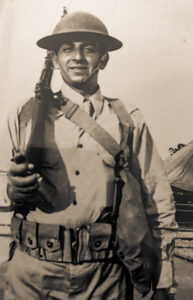In 1944 the signs of war were everywhere and even in the most remote parts of the parish people were aware of the great struggle that was taking place in Europe and the Pacific.

Everyone had a friend or relative who was fighting. Mother’s brother James McKnight was in the Italian campaign, our cousin Randall D Kaetor shot down the first Japanese Zero aircraft in the pacific. Uncle Floyd Farrow and a friend from Slatter St. (Albert Voclain) were on the ground in Europe; Uncle Joe Peil’s nephew survived the Bataan Death March. At night the family would huddle around the old radio and amidst the static and crackle we would listen to Walter Wenchel and Edward R. Morrow broadcast on the war news.

One night while the BBC was broadcasting we actually heard the bomb blast of Hitler’s vengeance weapons near the station and my father commented on how brave the British were in standing against Germany’s war machine.
Many goods were rationed and people were given little tokens that looked liked different colored pennies to buy certain foods. Trucks, cars, tires and nylon were unavailable and all petroleum products were in short supply. On the farm we fared better than most. As far as food was concerned we always were self sufficient, and because we were vital in providing food we were given all the fuel we needed. Shotgun shells were in very short supply and when hunting every shot had to bring something home to cook.
German U boats were sinking cargo ships and oil tankers in the Gulf of Mexico right off our coast and blimps were operating from the air port in Houma making daily flights over the Gulf on submarine patrols. Volumnia Farm is located only a few miles from the blimp (as air ships were called) base (now the Houma airport) and the blimp would pass very low over our house casting a huge shadow. People from miles around would go to the Blimp Base to see the huge air ships take off and land and be placed in huge hangers.
Civil defense groups were organized in case of attack, they feared the most chemical or biological weapons. My father Wilson J Gaidry was head of one group and wore a helmet with CD in a little triangle. One night an oil tanker was torpetoed in the Gulf south of Cocodrie so close to the shore that people could see the ship burning from the shore. Somehow the word got around that the Germans were preparing to invade Terrebonne Parish near Cocodrie. I remember well the confusion on the farm. Everyone was running around shouting “Les Allemands son venus, Les Allemands son venus”, the Germans are coming.
They began assembling in the front yard around my father’s old red Ford model B pickup truck with their old hammer 12 gauge shotguns to prepare to repel the German invasion of Cocodrie. To this day the picture is still clear in my mind of the old truck loaded with Cajuns with their old shotguns, the women crying hysterically and my father at the wheel with his CD helmet leaving to go to battle to save us, a momentous sight, one that should go down in the history and certainly one I will never forget. The next day the word was that the Germans got wind of what awaited them and canceled the invasion.
G J Peil
G J Peil was Uncle Joe Peil and Aunt Roberta Gaidry Peil's nephew that was in the Army defending the Philippines from the Japanese invasion at the beginning of World War II.
On December 8, 1941 the Japanese launched an attack on the Philippine Islands just 10 hours after the attack on Pearl Harbor. The Philippine main Island of Luzon and the capital of Manila were defended buy an unprepared Filipino army of about 100,000 and American Army of 23,000 led by General Douglas MacArthur. The Japanese quickly overran the Island and forced Mac Arthur’s forces to a defensive position on the Bataan Peninsula and then to the Island of Corregidor where they held out for four Months.
Once the Filipino and American forces were captured they were forced to march on what is known as the Bataan Death March and then for 3 1/2 years subjected to extreme brutality by the Japanese in forced labor prison camps. For months after the fall of Corregidor the family thought G J was dead until a year later a letter arrived from him when he was in the prison camp.
The prison camp was liberated by MacAuthur’s forces in January 1945. I remember G J well as a man permanently broken by the horrors he had experienced as a POW. Before the war he was going to LSU and was one of the Tiger Cheerleaders leading a happy life.
Read more:
-
Introduction to Farm stories
-
1. Residence Dairy
-
2. Wild horses
-
3. The war years
-
4. Carencro bayou
-
5. The alligators
-
6. The 1928 Chevrolet truck
-
7. The 1962 Ford truck
-
8. Le Traiteur
-
9. Disciples of Percy Viosca
-
10. Grandfather's cypress swamp
-
11. Jim Jack the cot driver
-
12. Campti: then and now
-
13. Mr. Pros


